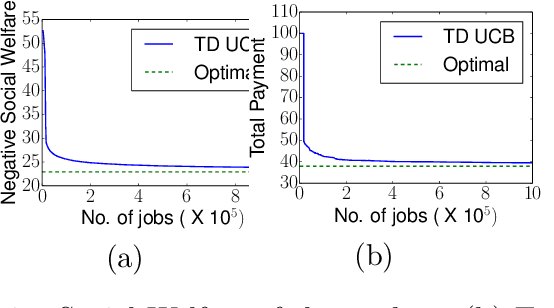Y Narahari
A Truthful Mechanism with Biparameter Learning for Online Crowdsourcing
Feb 12, 2016

Abstract:We study a problem of allocating divisible jobs, arriving online, to workers in a crowdsourcing setting which involves learning two parameters of strategically behaving workers. Each job is split into a certain number of tasks that are then allocated to workers. Each arriving job has to be completed within a deadline and each task has to be completed satisfying an upper bound on probability of failure. The job population is homogeneous while the workers are heterogeneous in terms of costs, completion times, and times to failure. The job completion time and time to failure of each worker are stochastic with fixed but unknown means. The requester is faced with the challenge of learning two separate parameters of each (strategically behaving) worker simultaneously, namely, the mean job completion time and the mean time to failure. The time to failure of a worker depends on the duration of the task handled by the worker. Assuming non-strategic workers to start with, we solve this biparameter learning problem by applying the Robust UCB algorithm. Then, we non-trivially extend this algorithm to the setting where the workers are strategic about their costs. Our proposed mechanism is dominant strategy incentive compatible and ex-post individually rational with asymptotically optimal regret performance.
 Add to Chrome
Add to Chrome Add to Firefox
Add to Firefox Add to Edge
Add to Edge